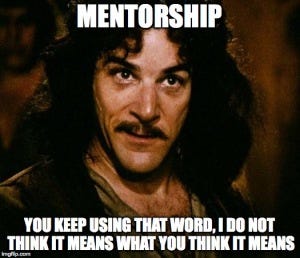From Mentee to Men-Tea: Sip Your Way to Success with Mentorship Tactics!
Tips on mentorship for early career PMs
Join 690+ others who get our best writing and interviews on how to level up your product skills as early career PMs.
Howdy 👋 Deekshit here and I am here to share why having a mentor is very important and how to find one.
Mentorship is a 2 way relationship that can not only help you elevate your professional career but also help your mentor in many ways.
Your mentor can help you through
Let you leverage their network to create more relationships.
Unique insights that can open up your perspectives.
Open up opportunities that you previously did not have.
Short circuit your path to success
As a product manager, you can choose to have multiple mentors based on your needs.
Your mentors need not necessarily be product managers. They can be from other domains as well, based on what you are looking for. It could be skill based v/s career based needs.
The advantage of being a product manager is that you are working with many stakeholders at any given time, you can always observe to see who inspires you and reach out to them to build a mentor-mentee relationship.
Here are some tips on what you should focus on to find mentors within your company.
Competence builds confidence
As an early career PM, it is natural to feel the need for more mentorship and to spend time searching for mentors, sometimes at the expense of your work. However, it is important to first build credibility around your work by successfully completing 1-2 projects. This will help you to reach out to people in your company for mentorship with confidence, knowing that your time and efforts will be impactful.
Focus on building relationships
When I joined my company, my manager provided me with a list of cross-functional people I need to talk to in my first two weeks. Having conversations with these cross-functional team members helped me understand their roles and made me appreciate how they can help me. So the next time I am stuck in a problem I can know whom to go to, how to get help and without any hesitation.
Most of the time, we are not in need of a mentor, rather people who can help us solve a specific problem. Building relationships with people in and around your team can help you do that.
Document your inspiration
Within your company, you will always find people who inspire. When you see them present, or talk about their product or their work ethic. In your mind, you go, “I want to be that”. These people are the ones you potentially want to ask mentorship from. Keep documenting about their work, and when you reach out to them to ask for help you can quote these specific examples where you thought they had deep insights and how they did that.
Provide value before receiving value
There are a lot of people who love mentorship, and provide value to folks without any hesitation. If they are within your company and you see them doing it, reach out to them without any hesitation.
However, there are people in your company who may not be as approachable, but who you still admire. Before reaching out to them with problems or requests for mentorship, you should try to provide them with some value.
You can contribute in small ways, depending on whether you are on the same team or not. If they are busy and cannot assist you right now, ask them if they would recommend anyone that they think would be able to help you instead of them.
Here are some examples to provide value, if they are a PM
Beta testing their product and sharing observations
Doing some competitive research on the product they are working on
Continuously providing observations and insights on the product they are working on.
Talk to them about your expertise and see if you can help them out in that particular area. (When Andy reached out to a director of product in another team, he shared that he can help university grads secure internships and the director took his offer and got his friend’s son to talk to Andy. This strengthened their relationship.)
These small tasks can help build a relationship between both of you, that can open up the gateways for a mentor mentee relationship.
Keep your mentorship ask specific
We love spending time on finding mentors and talking with them because we feel those conversations can change our career. But the main thing to understand is that every person’s career is different and advice works when it is specific to your career. Therefore, you need to keep your mentorship asks specific. In return, be specific on how you can add value to them as well, remember it is a 2 way street.
Here are some examples of good mentorship asks
I want to be promoted from PM to Sr.PM, what are the areas I need to tackle?
I am bad at presenting my product to leadership, can you help me with it?
Can you teach how you pitch the product to a potential SMB client?
I believe I am weak at X, can you help me overcome it?
Here are some examples of bad mentorship asks
Can you be my mentor and teach me about product management?
Can you help me grow my career?
Can you help me be the best PM?
That’s it for this post! Hope you liked it. If you did please do subscribe as we send out one article a week where we share tips on how to succeed as an early career product manager.
Follow us on Twitter as well- Andy Bharadwaj and Deekshit BN


